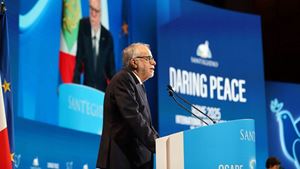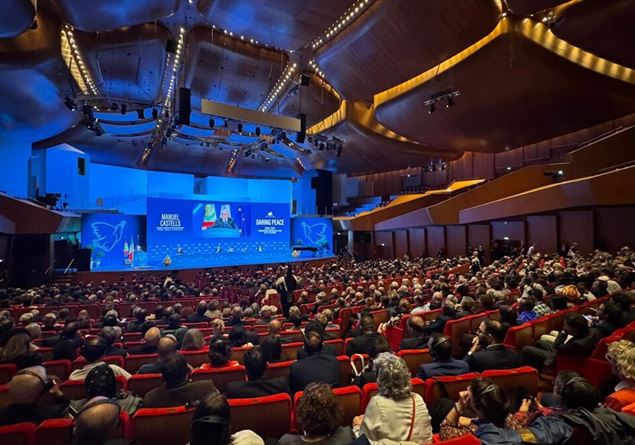The speech of President Sergio Mattarella.
«Dare to Peace», imagine the future of a world at peace. The title of the meeting in Rome from today to 28 October 2025 contains the restlessness of the “time of strength”, which has rehabilitated war as the main instrument for pursuing one’s interests and designs, humiliated the institutions created to achieve peace, trampled on international law in the face of one of the most dramatic conflicts of our time. Andrea Riccardi says this as he inaugurates, at the Auditorium Parco della Musica, the three-day event that brings together, from Europe and other continents, ten thousand people, hundreds of religious and political leaders. It is the “spirit of Assisi”, from the name of the city where John Paul II, on 27 October 1986, brought together the leaders of different religions to talk about peace at a time when the planet was divided into the two great blocks of the Cold War. Since then Sant’Egidio has incessantly brought the power of dialogue and prayer to many cities around the world.
Sergio Mattarella also participates in Rome and, amid loud applause from the audience, makes an appeal to “seek and dare for peace”. It defines as “hooliganism” those behaviors “which, while objectionable in personal relationships, claim to be considered political facts in international relations”; he asks himself “what leads us to dare enormous resources on the altar of war and not to build peace”. Speaking of the Middle East, Ukraine and Sudan, the President of the Republic cites Pius XII’s “nothing is lost with peace, everything can be lost with war”, adding that “the news arriving from Gaza tells us that peace processes require perseverance”. He quotes the Grand Imam of Al-Azhar, Ahmed Al-Tayyeb, who supported the “necessity for everyone to raise the banner of peace, not that of victory”. Mattarella also calls for “negotiating initiatives for Ukraine, while children suffer the ruthlessness of Russian aggression”.
Al-Tayyeb, the highest authority of Sunni Islam, and Pinchas Goldschmidt, president of the European rabbis, spoke at the inaugural ceremony. Their presence symbolizes the desire to “dare for peace” in the face of what is happening in the Holy Land. Peace – says the chief rabbi – is not a «fragile truce drawn on a parchment», but requires «the firm hand of the surgeon, the patient pen of the poet. It requires the wisdom to see the face of the other not as an enemy, but as a traveling companion.” He adds: «Peace is not won with the shouts of warriors, but with the whispers of us. It’s not insipid courtesy, it’s the strong flavor of enemies becoming friends.”

The founder of Sant’Egidio Andrea Riccardi.
Imam Al-Tayyeb recalled the urgency of recognizing Palestine in the direction of the two States, as well as underlining how dialogue between religions can affirm equity in crucial challenges, such as technological ones. He announces an ethical charter for artificial intelligence, the idea of which was designed with Pope Francis, «my late brother» with whom he had signed the Abu Dhabi Document on Human Fraternity in 2019. Today – he tells the audience – a joint group made up of Al-Azhar Al-Sharif, the Vatican and the Council of Muslim Wise Men is working to complete this document, so that «it becomes an ethical and human reference that regulates the correct relationship between human beings and the modern technologies they produce and to ensure that artificial intelligence remains at the service of human beings, not a weapon against them.”
Imam al-Tayyeb.
For Cardinal Matteo Zuppi, «many say: resign yourself, accept it, war is a sad but unavoidable reality of human history. Some even think it is necessary, because it purifies and generates change. No one really says they want it, but many give in to it.” Instead, the many Abels killed by the madness of war and the wisdom of the Bible remind us that «God is aware of the instinct that dominates us if we do not dominate it, so much so that in our brother we see an enemy, a competitor. God always helps us find brotherhood and asks us to account for where our brother is.”
The Japanese Kobo Kondo is moved by the memory of Hiroshima: she is a hibakusha, a survivor of the atomic bombing, who recalls the urgency of nuclear disarmament. He recounts the meeting with Captain Robert Lewis, co-pilot of the Enola Gay, the plane that dropped the bomb: «When I heard his name, I froze. He was the man I had hated for so long, the man I had imagined as a monster. But when I looked into his eyes, I saw something completely different. He was human. He was trembling and his eyes were full of pain.” When the host asked him how he felt after the bombing, he replied softly: “My God, what have we done.” In that moment, Kondo said, “everything inside me changed. I understood that if I continued to hate him, I would only continue to hate the violence that is within all of us.”
Kondo Koko.
«War is a failure of politics and humanity, a shameful surrender, a defeat in the face of the forces of evil», was Pope Bergoglio’s withering definition of war.
Daring for Peace means not resigning yourself to pessimism: «Moving from the age of war – explains Andrea Riccardi – to the age of dialogue and negotiation is not the magic of a day, but, when the dialogue begins, you can already taste the flavor of peace. Because dialogue means discovering the other as oneself.” This is what we will try to do in the three-day forums dedicated to the emerging issues of our time (peace, disarmament, environmental crisis, migrants, democracy and solidarity) until the final ceremony, on 28 October, in front of the Colosseum with Pope Leo XIV and the other religious leaders.
To explain its spirit, the founder of Sant’Egidio quotes Nothing new on the Western Frontthe book burned by the Nazis by the German novelist and fighter in the First World War, Erich Maria Remarque. A nineteen-year-old soldier speaks who discovers the humanity of the enemy: «Comrade, I didn’t want to kill you… Why have they never told us that you are poor dogs like us, that your mothers are in anguish for you as ours are for us, and that we have the same terror, and the same death and the same suffering? Forgive me comrade, how could you be my enemy? If we throw away these weapons and uniforms, you could be my brother.” Riccardi explains: «We want to start the dialogue before another comrade dies».


